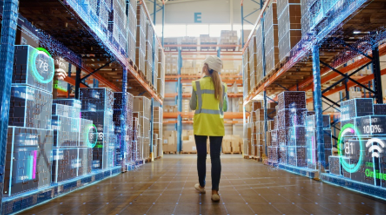Global e-Commerce continues to undergo rapid transformations and growth. Fuelled by the repeated pandemic lockdowns and virtually every physical retailer adopting Omni-channel distribution strategies, the global e-Commerce packaging market valued at USD 27 billion in 2020, is anticipated to more than double to USD 61.5 billion by 2026. A CAGR of over 14.5 percent[i]. Prompting a rise in demand for what Amazon coins ‘frustration free’ packaging and seamless shipping solutions.
To maintain pace with the rising relevance of on-line shopping, merchants are turning to logistic hubs to accelerate the flow of goods across the globe. Fast fulfilment is the critical differentiator. Given that the bulk of e-Commerce transactions are small, unique and lower value orders, the entire packaging, labelling and logistics process now needs to mirror the ‘anything … anytime … anywhere’ ethos and expectations.
Streamlining this fulfilment process, alleviating the shipping burdens and integrating automated print and direct apply systems with Order and Warehouse Management Systems, Clearmark Solutions examines the future e-Commerce despatch frontier and how its newest print and labelling technology meets specific efficiency challenges.
Last mile delivery
Ensuring doorstop deliveries reach consumers without delay is a critical part of the e-Commerce experience. Achieving a good order accuracy rate is reliant on many processing factors.
As the last touchpoint before the shipment journey, the labelling process is what shapes each and every customers’ view of an e-Commerce transaction. Those that deliver the best experience from start to finish can expect to enhance customer satisfaction, improve retention and brand loyalty, and secure repeat business. Conversely, a poor experience is likely to prompt a downpour of negative consequences, including potential customer deflections and brand-damaging social media reports.
In 2020, more than five billion parcels were moved from and within Great Britain, a rise of 33 percent on the previous year. For the global carriers, this level of movement tested the most robust infrastructures and digital capabilities.
The labelling process can be the marketing blind spot, cautions Clearmark’s Steve Hancock. In the race to expediate deliveries, it can be the area most overlooked. “Any e-Commerce unboxing experience is the moment of truth. When the delight can rapidly flip to disappointment.”
Just one poor delivery experience can cause consumers to switch to a competitor brand. A recent Trust Pilot report by technology platform HelloDone suggests that more than half (55 percent) of customer complaints are attributed to issues with the post-purchase experience. Steve affirms: “Without clear shipping labels, orders can be misplaced or hazardous items mishandled. These incidents can curate brand damaging customer experiences.”
Optimising order fulfilment
Shipping fulfilment is by nature a complex beast. Just as packaging is far from a ‘one size fits all’ business. Brands require personalised stickers, sizes, and designs and that, in turn, requires greater control over the label printing and application process. High volumes of personalised packaging plus the fast turnaround expectations can take their toll on all business sizes when it comes to the packaging line.
Growing demand for automation-related service contracts along with rising demand for automated equipment and increasing investments in logistics automation services are the major factors influencing the future e-Commerce landscape. Valued at USD 4.5 billion in 2020, the Warehouse Automation Services Market is expected to reach USD 9.11 billion by 2027, suggests a new report published by Brandessence market research. Flexibility and scalability are critical factors influencing the automation of e-Commerce packing and despatch lines.
The exponential increase of e-Commerce sales combined with rapid take up of logistics real estate has prompted a surge in R&D activities within Clearmark to resolve several labelling challenges.
ICE for the e-Commerce age
Post-Brexit, e-Commerce stakeholders and online sellers faced a plethora of changes to trading and export rules. While exports from the UK to the EU are still encouraged, the transition period expired on 1 January 2021. At the same time, the UK custom declaration documentation rules changed.
The compliance challenge when processing EU and global consignments in such high volume is the physical logistics of automating the application of an address label and CN22 label simultaneously without slowing throughput. Mandated by the Universal Postal Union (UPU) and the World Customs Organisation (WCO), a CN22 label must be affixed to parcels with contents valued at less than £270. For higher value items, a CN23 form is applied.


Given that packaging formats can often be too small to accommodate two labels side by side, Clearmark’s CN22 Dual ICE Vulcan Print and Direct Apply system gives e-Commerce carriers an innovative all-in-one parcel labelling solution that prints and affixes the address label on the top and the corresponding CN22 label on the parcel’s underside. Other regulatory shipment classifications and declarations can also be accommodated, including labels for different classes of dangerous goods. For example perfumes, flammable substances, corrosives and paints.
“Until now, applying a carrier label and printed CN22 label populated with the exact values on the reverse was typically performed manually. This was time consuming, labour intensive and prone to errors,” notes Steve.
Interfacing seamlessly with a logistic company’s Order or Warehouse Management System, the label printer instantly recognises if the package is being distributed outside of the UK and requires a mandatory customs declaration label. Matching the recipient’s name, the correct declaration form is instantly populated with the consignment values and a unique shipment tariff code. Dispensing and applying the matching shipment labels simultaneously onto the top and underside of the package within seconds.
Another labour-saving ICE Vulcan innovation launched in collaboration with shrink and stretch wrapping specialist Yorkshire Packaging Systems has answered calls for an efficient GDPR compliant labelling system. Uniquely integrated within the Flexo range of e-Comm bagging machines, the ICE Vulcan Direct Print & Apply machine reads then print and applies the corresponding delivery address label as the film is moving, reducing overall cycle time and optimising throughput. As soon as the label has been applied, the data record is removed. Ensuring 100 percent data security and compliance with GDPR regulations
“By using a one-in one-out real-time data flow within the Flexo bagger, with the ICE Vulcan mounted inside all connected to the shipping data management system, the potential for dispatch errors is negated,” states Steve.
Unboxing the future
The whitespace opportunities available to retailers and logistic hubs to get this final touchpoint right and integrated within the entire e-Commerce strategy are abundant, claims Steve.
Citing the benefit of future-proofing the pack and despatch experience, Steve points out the advantage of deploying flexible print on-demand technology that can expand and evolve with a growing business.
“Future proofing underpins the Clearmark ethos. Three times faster than other e-Commerce labellers, our ICE Vulcan is founded on this very principle. Delivering the labelling architecture that allows businesses to adapt and evolve as new packaging, order management systems and e-Commerce strategies emerge.”
[i] Mordor Intelligence E-Commerce Packaging Market report (2022-2027)








